
Degaga "Mamo" Wolde was an Ethiopian long distance runner who competed in track, cross-country, and road running events. He was the winner of the marathon at the 1968 Summer Olympics.
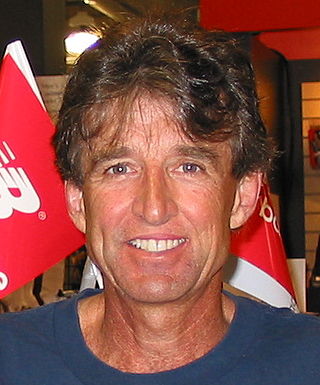
Frank Charles Shorter is an American former long-distance runner who won the gold medal in the marathon at the 1972 Summer Olympics and the silver medal at the 1976 Summer Olympics. His Olympic success, along with the achievements of other American runners, is credited with igniting the running boom in the United States during the 1970s.
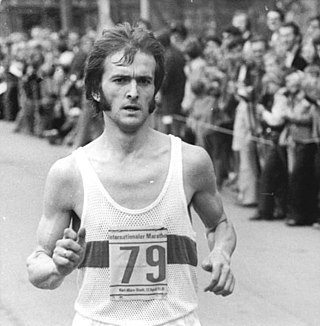
Waldemar Cierpinski is a former East German athlete and two-time Olympic champion in the marathon.

Francois Robert "Rob" de Castella is an Australian former world champion marathon runner.

Belgium competed at the 1972 Summer Olympics in Munich, West Germany. 88 competitors, 82 men and 6 women, took part in 51 events in 14 sports.

Belgium competed at the 1976 Summer Olympics in Montreal, Quebec, Canada. 101 competitors, 75 men and 26 women, took part in 80 events in 16 sports.

Belgium competed at the 1980 Summer Olympics in Moscow, USSR. In partial support of the American-led boycott of the 1980 Summer Olympics, Belgium competed under the Olympic Flag instead of its national flag. 59 competitors, 43 men and 16 women, took part in 51 events in 10 sports.
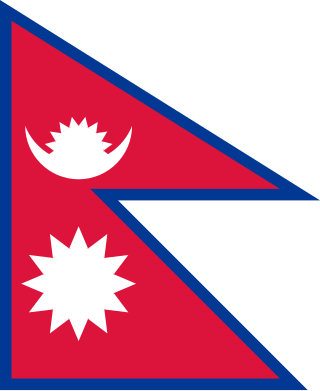
Nepal sent a delegation to compete at the 1976 Summer Olympics in Montreal, Quebec, Canada from 17 July to 1 August 1976. This was the nation's third time competing at a Summer Olympic Games. Nepal's delegation consisted of a single Marathon runner, Baikuntha Manandhar. He finished the race in 50th place.

The men's marathon at the 1984 Summer Olympics in Los Angeles, California, was held on Sunday August 12, 1984. The race started at 5:00 pm local time. There were 107 competitors from 59 countries. The maximum number of athletes per nation had been set at 3 since the 1930 Olympic Congress. A total number of 78 athletes completed the race.
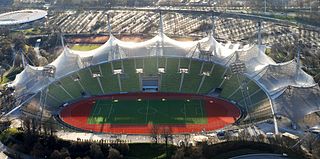
The men's marathon at the 1972 Summer Olympics in Munich, West Germany was held on Sunday September 10, 1972. The race started at 15:00h local time. There were 74 competitors from 39 countries. Twelve of them did not finish. The maximum number of athletes per nation had been set at 3 since the 1930 Olympic Congress. The event was won by Frank Shorter of the United States, the nation's first Olympic marathon victory since 1908 and third overall. Karel Lismont won Belgium's second medal in the marathon with his silver. Mamo Wolde of Ethiopia became only the second man, after his countryman Abebe Bikila, to win two medals in the marathon. Ethiopia's four-Games medal streak was matched only by Finland (1920–1932).

The men's marathon at the 1992 Summer Olympics in Barcelona, Spain, was held on Sunday August 9, 1992. The race started at 18:30h local time. One hundred and ten athletes from 72 nations started; 87 athletes completed the race, with Pyambuugiin Tuul from Mongolia finishing in last position in 4:00:44. The maximum number of athletes per nation had been set at 3 since the 1930 Olympic Congress. The event was won by Hwang Young-Cho of South Korea, the nation's first Olympic men's marathon medal. Koichi Morishita's silver was Japan's first medal in the event since 1968. Stephan Freigang of Germany took bronze, the first medal for Germany in the event though East Germany had won two golds during partition.
Donald Franklin Kardong is a noted runner and author from the United States. He finished fourth in the 1976 Olympic marathon in Montreal.

The men's marathon at the 1956 Summer Olympics in Melbourne, Australia was held on Saturday December 1, 1956. There were 46 participants from 23 nations, with 13 runners not completing the race. The maximum number of athletes per nation had been set at 3 since the 1930 Olympic Congress. The event was won by Alain Mimoun of France, the nation's first Olympic marathon victory since 1928 and third overall. Yugoslavia took its first Olympic marathon medal with Franjo Mihalić's silver. Finland returned to the podium in the event for the first time since 1932 as Veikko Karvonen took bronze.
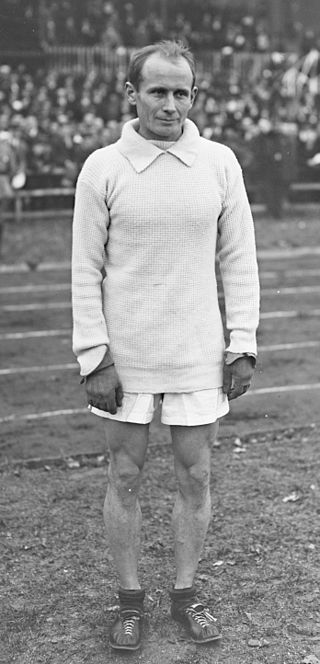
The men's marathon event was part of the track and field athletics programme at the 1920 Summer Olympics. The distance of this race was 42.75 kilometres. The competition was held on Sunday, 22 August 1920. 48 runners from 17 nations competed. No nation had more than 4 runners, suggesting the limit had been reduced from the 12 maximum in force in 1908 and 1912. The event was won by Hannes Kolehmainen of Finland, the nation's first Olympic marathon medal and victory; Kolehmainen received his fourth gold medal, having won the 5000 metres, 10,000 metres, and individual cross country in 1912. Estonia and Italy also won their first marathon medals.

The men's marathon at the 1980 Summer Olympics in Moscow, USSR had an entry list of 76 competitors, with 74 athletes from 40 nations starting and 53 runners finishing the race held on Friday 1 August 1980. The maximum number of athletes per nation had been set at 3 since the 1930 Olympic Congress. The event was won by Waldemar Cierpinski of East Germany, the second man to successfully defend Olympic gold in the marathon. Both the Netherlands and the Soviet Union won their first men's Olympic marathon medals.
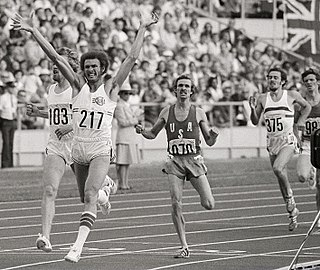
The men's 800 metres event at the 1976 Summer Olympics in Montreal was held on July 23, 1976, July 24, 1976, and on July 25, 1976. Forty-two athletes from 31 nations competed. The maximum number of athletes per nation had been set at 3 since the 1930 Olympic Congress. The event was won by Alberto Juantorena of Cuba, the nation's first medal in the event; Juantorena would later complete an unusual double in winning the 400 metres as well. Ivo van Damme's silver was Belgium's first medal in the event since 1960, matching the 1960 silver for best result for the nation.

The men's marathon event at the 1948 Summer Olympic Games took place on August 7. Forty-one athletes from 21 nations competed. The maximum number of athletes per nation had been set at 3 since the 1930 Olympic Congress. The race was won by Delfo Cabrera of Argentina, the nation's second victory in three Games. Tom Richards's silver medal put Great Britain on the podium for the third time in a row, while Étienne Gailly earned Belgium's first marathon medal with his bronze.

The men's 1,500m metres was an event at the 1976 Summer Olympics in Montreal, Quebec, Canada. The final was held on Saturday 31 July 1976 and was contested by 9 athletes. The semifinals were held on 30 July 1976 and were contested by 18 athletes. The heats were held on 29 July 1976 and 45 athletes entered; 42 athletes from 28 nations competed. The maximum number of athletes per nation had been set at 3 since the 1930 Olympic Congress. The event was won by John Walker of New Zealand, the nation's first 1500 metres title since 1964 and third overall. Ivo Van Damme's silver was Belgium's first medal in the event.

The Men's 110 metres hurdles event at the 1976 Summer Olympics in Montreal was held on July 26, 1976, and on July 28, 1976. Twenty-four athletes from 17 nations competed. The maximum number of athletes per nation had been set at 3 since the 1930 Olympic Congress.

The men's marathon event at the 2020 Summer Olympics started at 07:00 on 8 August 2021 in Sapporo, Japan. 106 athletes from 46 nations competed. The previous Olympic champion, Kenyan Eliud Kipchoge, successfully defended his title, with Dutch and Belgian athletes Abdi Nageeye and Bashir Abdi gaining silver and bronze, respectively. Kipchoge was the third man to repeat as Olympic marathon champion, after Abebe Bikila and Waldemar Cierpinski. The Netherlands and Belgium earned their first men's marathon medals since 1980 and 1976, respectively.

















